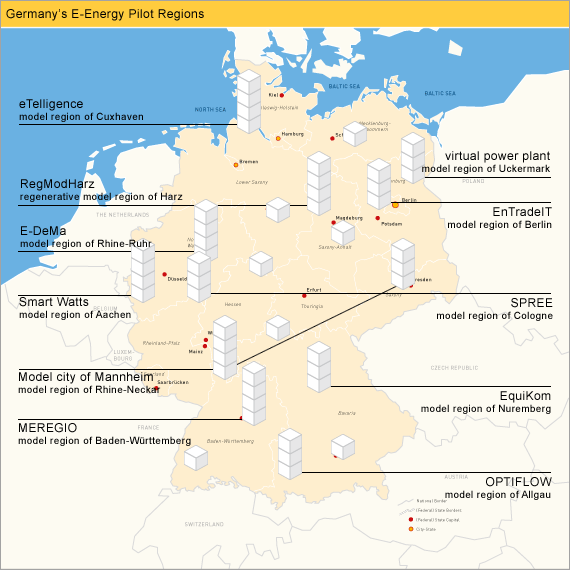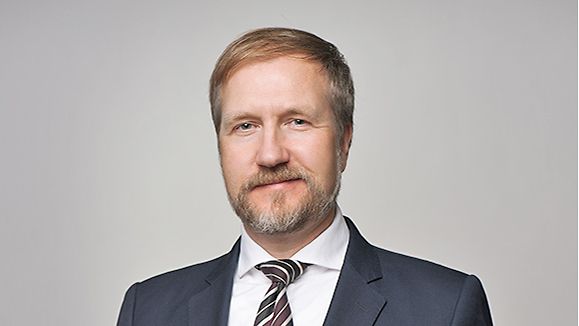Germany's E- Energy Model Projects
Six model regions were identified as winners of the national beacon "E-Energy: ICT-based energy system of the future" project. For the first time, exemplary "energy internet" projects will be set up across the country. The four-year project acts as a test-bed for the creation of a genuinely smart power system in which all actors and processes are intelligently linked.
From the beacon into the regions: The six pilot regions (on the left) and the other finalists (on the right) in the E-Energy technology competition are developing solutions for the ICT-based energy system of the future.

eTelligence
The eTelligence project in and around the northern port of Cuxhaven is testing an idea for a smart grid in a rural area with a high share of renewable power generation from sources such as wind power. A consortium led by power company EWE AG is developing a marketplace for energy that balances out fluctuations in wind energy generation and brings together producers, energy users and network operators.
Even private households can sell electricity by using plug-and-play appliances that operate automatically in the market. Cuxhaven is a fishing port and the new power system being tested takes advantage of its many cold storage houses. Their energy needs are balanced out with the requirements of the town's swimming pools, for example, in a way that enhances efficiency and ensures a steady power supply from wind, biogas, solar and combined heat and power plants.
E-DeMa
In the western Rhine-Ruhr area, the E-DeMa project is testing a smart grid in a region that has both rural and urban areas and therefore poses particular technological challenges for efficient power generation. E-DeMa wants to turn the electricity consumer into a "prosumer" - a client who both produces and consumes power.
The consortium includes RWE Energy AG and Siemens AG and is developing an intelligent power consumption control system which ensures the real-time collection and provision of consumption data. The project also aims to optimize network operation management in decentralized distribution networks. It will allow consumers to regulate their energy consumption from their living rooms based on real-time information on when peak periods are over and the price of power is at its lowest.
MeRegio
The third model region is located in the state of Baden-Württemberg. The vision of the MeRegio project is to create a minimum emission region. In the MeRegio model house, the dishwasher switches itself on when power is cheap, and electricity is generated through solar panels on the roof or a combined heat and power (CHP) plant in the basement.
The household appliances are interlinked via communication technology and connected to a smart system platform. Smart mobility also comes into play. The electric vehicle is parked in the garage and its battery is charged when the mini-CHP produces more electricity than the grid can take. If necessary, the electricity from the battery can also be fed into the grid.
Since November 2009 some 100 private households have joined the project to help build up the smart grid system, electronically providing information on their everyday energy usage to the local network operator to help develop a low-emission, maximum efficiency power grid.
Model City of Mannheim
The Model City Mannheim project is testing a smart grid system that is suitable for a conurbation and which makes heavy use of decentralized renewable power sources. The cities of Mannheim and Dresden are taking part in a large-scale trial using new methods to improve energy efficiency, grid quality, and the integration of renewable and decentralized sources of energy into the urban distribution network.
Electricity is offered to customers close to the point of generation and immediately when the power is generated. This avoids having to transport power (a process in which power is lost), and includes the use of decentralized energy storage units. So-called "prosumers" can adjust their power consumption and power generation in line with variable pricing structures. And real-time information and energy management help the customer contribute to even greater energy efficiency.
RegModHarz
RegModHarz (short for "regenerative model region of Harz"), is developing a "virtual power station" grouping renewable power generators, consumers and energy storage facilities. By coordinating production, storage and consumption, the project aims to prove that it is possible to achieve stable, reliable and consumer-oriented electrical power from a high proportion of renewable sources.
SmartWatts
The sixth project, SmartWatts, is located in the western city of Aachen where companies are developing an intelligent grid based on the concept of a smart kilowatt hour in which participating households can see where the electricity was produced, how it was transported, and how much the power currently costs. The aim is to develop a system in which household appliances primarily consume renewable electricity when it is available at low cost (for example, in strong wind or sunshine).
The projects are attracting interest outside Germany. In July 2010, representatives of the SmartWatts project signed a memorandum of understanding with LG Electronics in Seoul. LG Electronics will contribute servers and other hardware to integrate any brand of household appliance into the smart grid via the open EEBus system developed by SmartWatts to enable power companies and customers to exchange power usage information.
